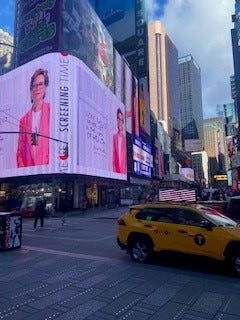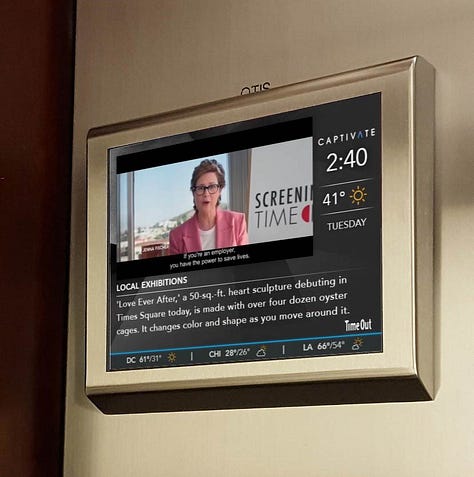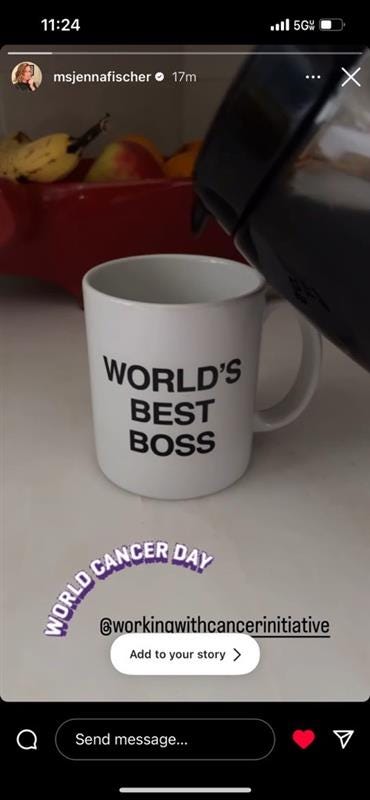How staying delusional helped us pull off something incredible
And how you can join Jenna Fischer to save 10,000 lives
On Monday, the Working with Cancer initiative launched Screening Time Off—with a film starring Jenna Fischer.

Jenna is a triple negative stage 1 breast cancer survivor, and the actor who played Pam in The Office: so, who better to advocate for the importance of taking time away from work to take care of your health—no matter how crazy it is at The Office!
Today, I’m filled with so much positive emotion:
Hope for life-changing and life-saving impact: if we can raise screening compliance by just 10 points, we’ll save more than 10,000 lives
Gratitude for the incredible team that brought this from idea to reality in a matter of just weeks: the film was just shot last Monday, and was on-air exactly one week later—and that’s not to mention almost 200 creative assets delivered on the same timeline
And I’m incredulous at how many barriers we encountered and surpassed along the way—we didn’t make contact with Jenna until the first week of January, then went from her agreement to help us to being on-air in less than three weeks! Also, she was awesome in all kinds of ways. All of this has convinced me that everything we set out to do was in fact meant to be.
I’m so glad I decided to #staydelusional moving into 2025!



The idea for Screening Time Off as an employer program came well over a year ago: more than half of us are behind on recommended cancer screenings, and the team thought that employers could do something about that by giving people time to get screened.
If I’m honest, it wasn’t love at first sight for me.
It’s not that I was necessarily against the idea of screening, per se—obviously, screenings save lives, how could anyone object to that? But as the program director of Working with Cancer, I worried that putting too much focus on screenings and preventative care might make it too easy for employers to stop there: when we were trying to encourage the creation of a supportive, recovery-forward experience after diagnosis.
With more experience and more data, my attitude shifted:
The quest to create the expectation of a supportive workplace begins before diagnosis. Better understanding your benefits and the stance of your company pre-diagnosis makes it more likely that someone feels safe and supported after diagnosis
Relevance drives message engagement, always—a message about screening, which impacts almost all adults, is more likely to break through versus one about a specific benefit for impacted employees
And critically—early detection and preventative care are a powerful gateway to employer engagement; it’s the easiest way to show concrete positive impact
When I speak with major employers (most of whom have self-funded healthcare plans) about the Working with Cancer pledge, I often point out that any programming they might choose to activate could be paid for many times over if they save themselves just one stage-four cancer diagnosis.
And that’s just the cost benefit.
For every two extra diagnoses a company can help uncover by encouraging screening, they’ll save at least one extra life. (And by that I don’t mean, one in two will survive—I mean, one of their employees will live, when he or she otherwise would have died.)
In today’s political climate, trust is going down across the institutions on which we used to historically rely, including NGOs, government, and the media. Today, people trust businesses more than anything else. And in the US, almost 80% of us rely on employer-sponsored healthcare policies.
Which means that every company, whether they realize it or not, is now in the healthcare business.
If you run a business—or have influence at one—making it easier for employees to take the time they need to get screened makes sense both financially and morally. Screening Time Off provides downloadable tools and resources you’ll need to activate an impactful program internally.
And all of us have the potential to save a life by sharing a reminder. Maybe someone you love, or work with, or love to work with, has been meaning to get screened—once it calms down at work / with the kids / after the holidays. Maybe your poke will convince them to prioritize themselves or otherwise nudge them into action.
It may not sound like much, but I did the math (because of course I did) and am even more convinced: if just 1% of my ~2,000 LinkedIn connections share my reminder to get screened, and 1% of their connections share (and assuming average number of connections and demographic composition and a modest screening compliance lift as a result)—we’d reach over 350,000 people and save more than 15 lives.
So, first: make your own appointments. (Check this quiz if you don’t know what’s recommended.)
And then, share a post encouraging someone else to do the same—and I’ll give you lots of options:
You can share Jenna’s video on YouTube
Or Jenna’s post on Instagram
Or share this post from the Working with Cancer Initiative on LinkedIn
Or even just share this post!
And whether you’re a boss or just have one, the title of World’s Best Boss is up for grabs, and it starts with joining Screening Time Off.
And as always, and maybe today more than ever: thank you, thank you, for your support!






Go Gina!! This is fantastic!